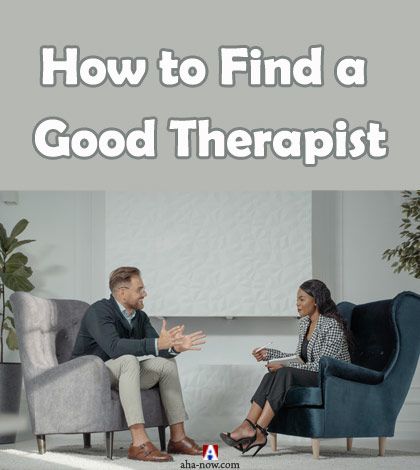How to Find a Good Therapist

Table of Contents
It helps to visit a therapist if you have mental or emotional issues affecting your life. It is also important that you find a good therapist that suits you. There may be many options to choose from. Here are the tips you can use to find a good therapist for better mental health. ~ Ed.

Suppose you are struggling with mental health issues. You probably want to know how to find a good therapist. There are so many distinctions and a plethora of possible letter combinations after a mental health professional’s name. There are also specializations and tons of resources to help you find the right therapist for you. So how do you begin to look for a therapist?
First, it is essential to look at the different labels that therapists may have. Each clinician has a different level of education. Some providers have gone to graduate school for social work, while others have a doctorate in psychology. It is important to note that one degree does not trump another one.
You could see an LPC (Licensed Professional Counselor) who is an excellent therapist. Before you found that provider, maybe you worked with a Ph.D. who was not the best fit for you. Here are the different degrees that therapists can hold and what they mean.
Credentials and Labels
Credentials or labels do not indicate whether or not a therapist is good at their job. They are simply an explanation of what area the mental health professional has studied. It is a good idea to have a basic understanding of the differences. However, experience, referrals, and specializations may be more important depending on your situation.
Psychologists are experts in psychology who hold a Ph.D. or a PsyD. They study human behavior and the mind. These clinicians are trained in psychotherapy, counseling, and many times psychological testing. They commonly use cognitive-behavioral therapy (CBT) to help people identify patterns and behaviors. Then, they can help the person change their negative or unhealthy habits.
Psychiatrists are doctors who specialize in the treatment of mental or psychiatric illnesses. They are also licensed for prescribing medications and trained in talk therapy. They can also help you change your thought patterns or behavior.
Social workers are specialists that offer social services in order to help out a person’s functioning related to psychological or social issues. They can also offer counseling related to social or interpersonal problems and can help you function in your situation or environment. You may see their credentials listed as an MSW (Masters in Social Work) or LCSW (Licensed Clinical Social Worker), or LMSW (Licensed Master Social Worker).
Licensed professional counselors (LPC) have to hold at least a master’s degree in counseling and 3 thousand hours of experience after obtaining that degree. They are licensed or certified to diagnose and treat mental and emotional disorders. Typically, they are qualified to help you with a range of different issues, including anxiety, depression, emotion management, confidence or self-esteem, substance use or addiction, interpersonal relationships, and more.
What to Consider in a Therapist?
It is crucial that you are comfortable with your therapist since you will be speaking about personal issues with them. Therefore, it is a good idea to take some additional things into consideration.
If you feel more comfortable speaking to a man or woman, make sure you take that into account. You should also take their age and religious preferences into consideration if those things are important to you. Find someone that you are comfortable opening up to and speaking with because you will develop a relationship with this therapist.
Whether you are searching for an online therapist or visiting an office, you may be asked some questions about preferences or reasons for seeking a mental health professional. This can help to determine therapists that offer relevant services.
Also, it may help you remember that you can always change therapists if you decide you are not connecting with or getting along with the first one that you try. Never feel like you have to push through and continue sessions with a therapist unless you truly want to keep going.
Related Posts
Where to Look?
There are tons of online resources that offer the ability to match with a qualified therapist online. You can also use Google to look for specific types of therapists that are in your area. Most therapist offices will be easy to find by searching and even have web pages that you can look at to see if they may be a good match.
If you do not want to rely on the internet to find a therapist, there are other methods to narrow down your search. You can always ask friends, family members, or your doctor if they have any recommendations. You can even ask a therapist you find if they have any nearby recommendations for a therapist that specializes in a specific illness or style of treatment that you are seeking out.
The First Session
Treat your first meeting with a therapist as a way to see if the relationship is a fit match. It is sort of like dating. You do not have to commit to a relationship just because you went on one date with someone. The same principle goes for a therapist-client relationship. If you feel like it is not a good fit, you do not have to keep seeing that counselor. If you feel comfortable, you can always ask them for recommendations or suggestions for finding someone else.
A professional therapist will generally be happy to help you in any way that they can. Furthermore, there are some questions that you may want to ask your therapist when you first speak with them. It is a good idea to ask how long they have been in practice and what type of experience they have treating people in a similar situation or with similar problems as you.
It may also be smart to gauge their level of empathy and warmth. This can be a good indicator of your ability to form a connection with them. They will also ask you relevant questions that will help them determine the best steps to improve your mental health. You may also want to ask them questions about progression or their therapeutic methods or process.
Final Thoughts
Finding a therapist does not have to be stressful, and it is a good idea to remember that you are never stuck with the first therapist that you meet.
Use any resources at your disposal and ask your therapist questions. You can narrow down your search by finding therapists that have experience with similar situations or problems that you have.
Use the internet to locate online therapists through apps or use a search engine to find local therapists that may be a good match.
Over to you
Have you ever had sessions with a therapist? How did you find your therapist? Share your suggestions and tips in the comments section.
Disclaimer: We're not offering any medical advice here. These ideas are for educational and entertainment purposes only. Always seek a professional medical opinion from a physician of your choosing before making any medical decision. The information provided here is not intended to be a substitute to the advice given by your physician or another healthcare professional.
Disclaimer: Though the views expressed are of the author’s own, this article has been checked for its authenticity of information and resource links provided for a better and deeper understanding of the subject matter. However, you're suggested to make your diligent research and consult subject experts to decide what is best for you. If you spot any factual errors, spelling, or grammatical mistakes in the article, please report at [email protected]. Thanks.















Very nice blog. I really like the way you shared the knowledge and your viewpoint on therapy. Please keep it up!